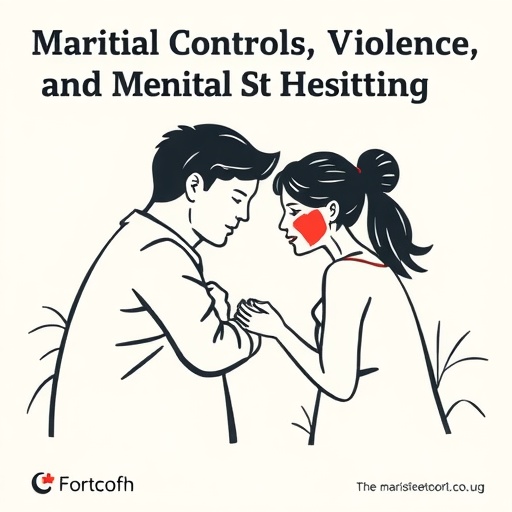In societies marked by rigid patriarchal norms, the interplay between marital control, domestic violence justification, and women’s mental health remains a profound yet often overlooked crisis. Recent groundbreaking research from Bangladesh highlights how these gendered power imbalances contribute to severe mental health issues among married women, shedding light on a hidden epidemic affecting millions. This study, published in the reputable journal BMC Psychiatry, offers the most comprehensive national data to date, revealing the intricate connections between cultural acceptance of domestic violence and psychological distress.
The investigation leverages data from the 2022 Bangladesh Demographic and Health Survey, employing clinically validated instruments such as the Generalized Anxiety Disorder (GAD-7) and Patient Health Questionnaire (PHQ-9) to measure anxiety and depression, respectively. These tools provide rigorous quantification, allowing researchers to uncover nuanced mental health patterns that correlate strongly with prevailing marital dynamics. The study reveals alarming statistics: approximately 27% of married women interviewed experienced mild to severe anxiety, and nearly 30% showed symptoms of depression, with a subset facing moderate to severe conditions, indicating urgent public health implications.
One of the most striking findings concerns the widely accepted justifications of domestic violence under specific circumstances. The data demonstrate that endorsing wife-beating—whether for reasons such as leaving the house without informing the husband, neglecting children, engaging in arguments, refusing sexual relations, or burning food—is significantly associated with higher odds of developing moderate to severe anxiety and depression. This normalization of violence is deeply entrenched in the socio-cultural fabric, perpetuating a cycle of abuse and psychological harm that is both systemic and insidious.
The study employs advanced statistical methods, including binary logistic regression and stepwise multiple regression analyses, to identify the strongest predictors of mental health outcomes. Notably, terminated pregnancy emerges as the most potent indicator of anxiety and depression, underscoring the complex interrelations among reproductive health, societal pressures, and mental well-being. This finding aligns with global evidence linking adverse reproductive events to heightened psychological distress, emphasizing the need for integrated healthcare approaches addressing both physical and mental health in women.
Socioeconomic factors also play a crucial role. Women’s educational attainment and opportunities for continuing education after marriage significantly influence mental health outcomes, reinforcing the protective effect of empowerment through knowledge and socio-economic independence. In stark contrast, limited education and entrenched social expectations exacerbate vulnerability, suffocating agency and elevating the risk of mental health disorders.
This research underscores the disproportionate burden borne by women in patriarchal societies like Bangladesh, where marital control mechanisms and cultural validations of violence not only threaten physical safety but also erode mental health, often invisibly and insidiously. The findings emphasize that mental health interventions must go beyond individual-level treatment and encompass societal transformation, including challenging deeply held norms that rationalize violence and erode autonomy.
Beyond the statistical associations, the study paints a vivid picture of the lived experiences of married women navigating complex interpersonal dynamics marked by control and coercion. The normalization of wife-beating for perceived transgressions reveals an entrenched culture of gender-based violence, where women’s silence and acceptance become survival strategies in an environment that systematically marginalizes them.
The authors advocate for culturally sensitive and contextually tailored interventions that address the root causes of mental health disparities. Such initiatives should incorporate family-centered approaches, empowering women while engaging men and community leaders to reshape harmful gender norms. The urgency of these measures is compounded by the high prevalence rates of anxiety and depression revealed in this study, demanding immediate policy attention.
Importantly, the study calls for longitudinal research to unpack causal pathways and to include broader determinants such as social support systems and coping mechanisms. This future-oriented approach is critical for developing comprehensive, effective mental health policies in low-resource settings, where women are often doubly marginalized by poverty and cultural constraints.
The implications extend beyond Bangladesh, providing critical insights applicable to similar patriarchal contexts worldwide. As gender inequality and domestic violence continue to manifest as global public health challenges, this research adds to the growing body of evidence advocating for integrated strategies combining mental health services with gender justice initiatives.
In sum, this study demystifies the profound yet silent impacts of marital control and domestic violence justification on women’s mental health. It reveals a dire need for systemic reforms that embrace women’s autonomy, challenge normalized violence, and prioritize mental well-being as an integral component of social and health policy agendas.
The study marks a significant advance in understanding how entrenched cultural beliefs around gender and violence manifest as mental health burdens for married women, ultimately calling for a comprehensive reimagining of interventions to foster resilience, justice, and well-being in patriarchal societies.
Subject of Research:
The study investigates the relationship between marital control, justification of domestic violence, and mental health outcomes (specifically anxiety and depression) among married women in Bangladesh.
Article Title:
Marital control, domestic violence justification, and mental health: a study of married women in Bangladesh
Article References:
Tohan, M.M., Zaman, S., Saha, B.R. et al. Marital control, domestic violence justification, and mental health: a study of married women in Bangladesh.
BMC Psychiatry 25, 886 (2025). https://doi.org/10.1186/s12888-025-07133-3
Image Credits: AI Generated




